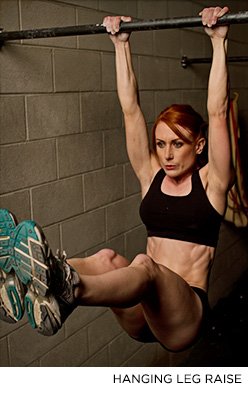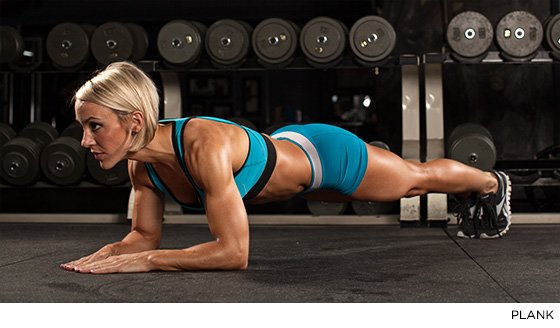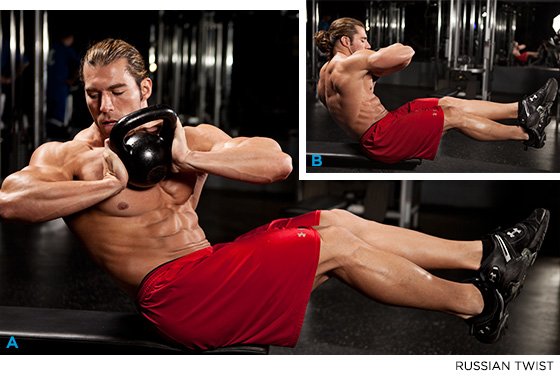Chest | Back | Shoulders | Arms | Quads | Hamstrings | Calves | Abs

Never had a six-pack? Want one? I know it might seem impossible, but honestly, carving visible abdominal muscles is a simple process. It all depends on having low body fat.
The recipe for abdominal shaping is simple, but it takes a lot of time. If you have a lot of body fat, it will take even more time. There's no specific exercise or magic vegetable that suddenly gives you the stomach of a Greek god—just good old fashioned hard work. Remember, months and years pass whether or not you work toward physique goals, so why not give it a shot? If you want to see your six pack abs in the mirror, put in the hours!
The core is made up of more than just your rectus abdominus. It includes the musculature that wraps around your spine and connects to your pelvis. Most people are just worried about the abdominal wall, but making improvements to your strength and athletic abilities demands core work.
That doesn't mean doing sit-ups for days. If you already perform a variety of compound exercises—and you should—your abs and core are already worked and strengthened indirectly. For example, your abdominals are major stabilizers during the squat. Heck, a sufficiently strong core is necessary to move any significant amount of weight.
Think about it this way: if your core is unable to support the weight you place on your back, your body would just fold over.
Having a solid core will benefit you in numerous other ways. One of the leading causes of lower back pain is a weak core.1 Other benefits of core strength are improved balance, enhanced stabilization during dynamic movements, and injury prevention.2
Okay, so what about seeing your abs? Well, building larger abs in the gym will allow them to become visible at higher levels of body fat. I don't advocate spending a huge amount of your time in the gym doing ab exercises—it's inefficient and your time is better spent on other lifts. The focus of ab work should be on strengthening your core as a whole. However, I still recommend working your abs directly.

The best way to do ab work is to incorporate the following three exercises into your regimen. They cover all of the major muscles of the abdominal region, which will help get you that 6-pack. Make sure you use progression to increase your strength. You want to build stronger, bigger ab muscles so they'll poke through even if your body fat isn't super low.
I suggest 2-3 sets of each exercise per week. You may complete them all on the same day or do each movement on a separate day. I work out 3-4 days per week and perform one ab exercise per workout, at the end of three of those workouts.
1 / Hanging Leg Raise (Flexion and Extension)
Flexion and extension movements are the most common type of ab exercise. To get the most out of the hanging leg raise, make sure you engage your pelvis. If you don't move your pelvis, you just use your hip flexors to do the work. Other flexion/extension exercises include variations of the sit-up, including the decline sit-up.
2 / Russian Twist (Rotation)
Rotational exercises work your whole abdominal region, but they stress your internal and external obliques. As I said before, increase the weight as you get stronger. For other options, try cable rotations or side crunches.

3 / Plank (Stabilization)
Stabilization exercises emphasize your transverse abdominus—the deepest abdominal muscle that wraps around your spine. This muscle is responsible for your overall balance and stability, so don't neglect it! Make progress by planking for longer durations or placing weight on your back.
References
- Hodges, Paul W., and Carolyn A. Richardson. "Inefficient muscular stabilization of the lumbar spine associated with low back pain: a motor control evaluation of transversus abdominis." Spine 21.22 (1996): 2640-2650.
- Barr, Karen P., Miriam Griggs, and Todd Cadby. "Lumbar stabilization: core concepts and current literature, Part 1." American journal of physical medicine & rehabilitation 84.6 (2005): 473-480.
- Arokoski, Jari P., Taru Valta, and Olavi Airaksinen. "Back and abdominal muscle function during stabilization exercises." Archives of physical medicine and rehabilitation 82.8 (2001): 1089-1098.
- Richardson, Carolyn A., et al. "The relation between the transversus abdominis muscles, sacroiliac joint mechanics, and low back pain." Spine 27.4 (2002): 399-405.
